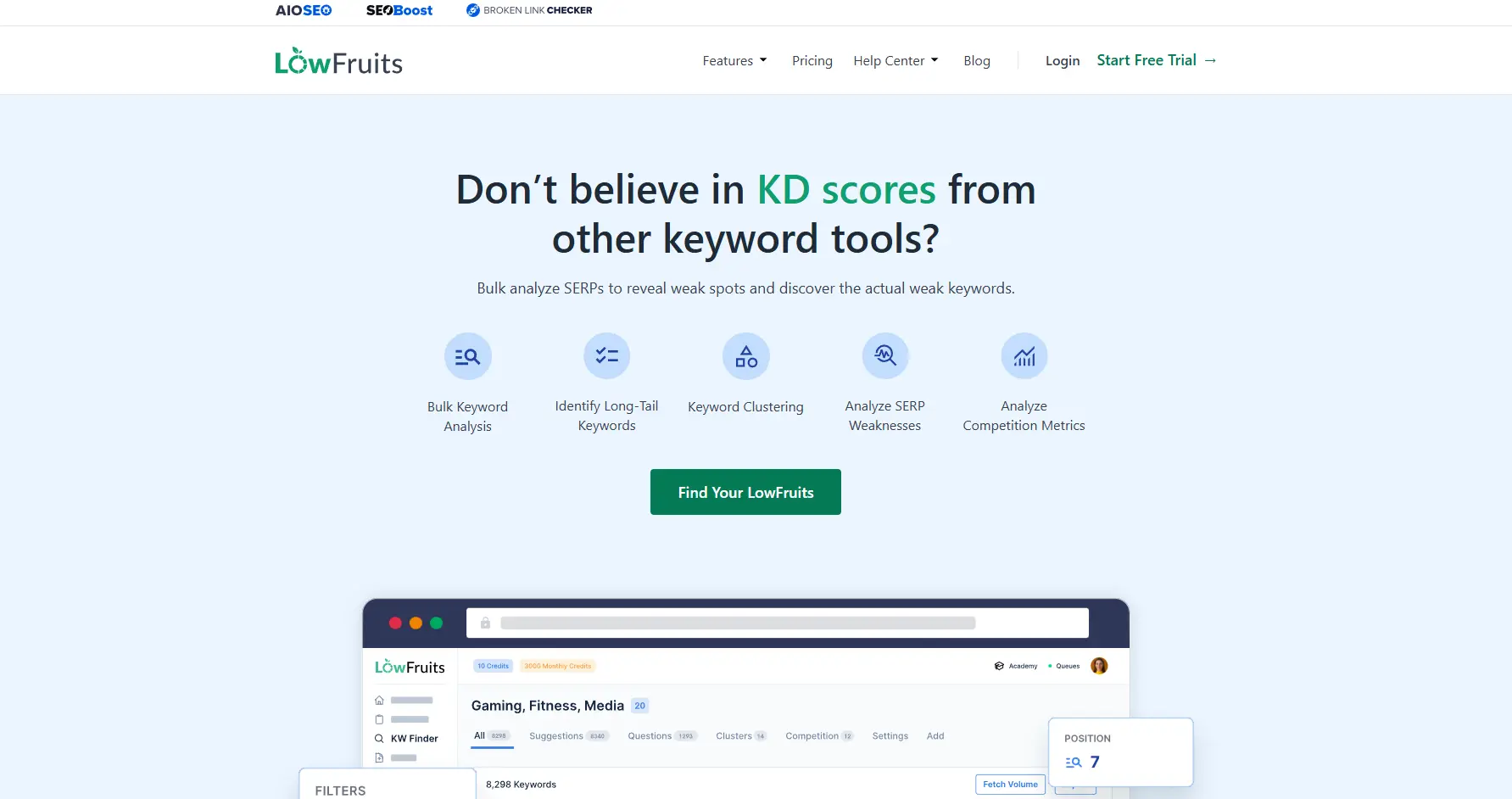How to Find Low Competition Keywords (Ultimate Guide for Beginners in 2025)
If you’re feeling burnt out from pouring hours into blog posts, product pages, or affiliate reviews—only to see them vanish into the depths of Google’s search results—you’re not alone.
It’s frustrating. You’re doing everything “right.” You’re writing quality content. You’re optimizing for SEO. You’re promoting your posts. But still… crickets.
What most people don’t realize is that success often starts before you even write a single word—by learning how to find low competition keywords that your site can actually rank for.
Ranking on Google is more competitive than ever. Millions of new pieces of content go live every single day. And unless you’re targeting the right keywords—the kind your site can realistically rank for—your content won’t stand a chance, no matter how good it is.
But there’s good news.
There’s a proven strategy that can help even brand new sites break through the noise:
👉 Learn how to find low competition keywords.
This single skill is a complete game-changer. Master it, and you can:
✅ Rank faster, even with a brand new domain
✅ Attract targeted, high-converting traffic that’s ready to take action
✅ Grow your domain authority by consistently ranking for achievable keywords
✅ Monetize your content with affiliate links, digital products, or email opt-ins
✅ Avoid burnout by writing content that actually gets seen and drives results
And here’s the best part:
You don’t need expensive tools or advanced SEO knowledge to get started.
Some of the best keyword research tools out there—like Semrush, LowFruits, and Mangools—offer generous free trials, free-tier features, and affordable plans that give you all the data you need to make smart decisions.
Spend just a few hours learning how to find low competition keywords, and your entire SEO strategy shifts. You stop guessing and start knowing exactly what kind of content to create—and why it’ll rank.
💡 Already building out your blog or affiliate site? Make sure your email marketing stack is just as optimized as your SEO. Check out our in-depth Affordable AI Email Marketing Tools for Startups in 2025 to see how this affordable tool can help you grow your list and boost conversions—fast.
So if you’re tired of working hard with little to show for it…
If you’re ready to finally get traffic, leads, and sales from your content…
It’s time to stop winging it.
It’s time to get strategic with your keywords.
Let’s dive in and unlock the power of low competition keywords. 👇

🧠 What Are Low Competition Keywords?
Low competition keywords are specific, long-tail phrases that still have search demand—but aren’t dominated by high-authority websites.
They’re perfect for:
-
New blogs
-
Niche websites
-
Affiliate marketers
-
Content creators who want traffic without waiting 6–12 months
✅ Traits of a Low Competition Keyword:
-
3 to 6+ words long (e.g. best budget email tools for beginners)
-
Monthly search volume between 50–1,000
-
Top results include Reddit, Quora, forums, or thin blog content
-
Not aggressively targeted by high-authority sites
Learning how to find low competition keywords means you can build SEO content that ranks with less effort—and starts bringing in traffic and conversions sooner.
🚀 Why Low Competition Keywords Matter in 2025
Google rewards relevance, intent, and quality—not just big domains.
When you use low competition keywords:
-
You rank faster (especially if your domain is new)
-
You target searchers with intent (people closer to buying or subscribing)
-
You waste less time creating content no one sees
-
You can monetize through affiliate links, lead magnets, or services
Whether you’re in ecommerce, affiliate marketing, coaching, or content creation, knowing how to find low competition keywords is one of the most profitable skills in digital marketing today.
🛠️ How to Find Low Competition Keywords: Step-by-Step
Let’s explore how to find low competition keywords using tools that are powerful—but accessible, even if you’re just starting out.
These tools all offer free trials, freemium plans, or affordable pricing:

🍋 1. LowFruits.io – The Hidden Gem for Long-Tail Keyword Gold

If you’re trying to figure out how to find low competition keywords without spending hours combing through Google or dropping hundreds on SEO tools, you’ll love this: LowFruits.io.
This underrated tool is a total game-changer. It’s built specifically to help bloggers, affiliate marketers, and niche site owners uncover easy-to-rank keywords by analyzing what’s actually ranking in the search results (SERPs).
Instead of just showing you search volume and keyword difficulty scores like every other tool, LowFruits goes deeper—it identifies real opportunities based on who’s already ranking. Weak sites? Forums? Reddit threads? That’s your green light.
🔍 Why LowFruits Is So Effective:
- Spots weak competitors like Quora, Reddit, or low-authority blogs in the top 10 results—so you know exactly where you can outrank with better content
- Uses visual “fruit icons” to show how easy a keyword is to win—color-coded for quick decision-making
- Great at surfacing question-style keywords, which are perfect for info posts and affiliate content
- No monthly subscription—just pay-as-you-go credits, which makes it super affordable
👉 Try LowFruits Here
🧠 Use Case in Action:
Let’s say you want to rank for something like “email platforms for affiliate marketing.”
LowFruits scans the current SERP and shows you if it’s filled with big players like HubSpot—or if it’s wide open, with Reddit threads and low-authority posts you could easily beat.
Even better, it’ll suggest dozens of related long-tail terms like:
- “best email tool for affiliate blogs”
- “email automation for beginner affiliates”
- “free email marketing software for affiliate marketing”
This is exactly how to find low competition keywords that don’t just drive clicks—but attract the right kind of traffic: targeted, ready-to-convert, and easy to rank for.
Whether you’re building your first niche site or scaling your content empire, LowFruits.io is a simple, affordable, and incredibly effective way to uncover hidden SEO wins.
👉 Try LowFruits here and start building content that ranks without the guesswork.
🔴 2. Semrush – The All-in-One SEO Toolkit That Does It All

If you’re serious about content marketing or affiliate SEO, Semrush is the heavyweight champ of keyword research and competitive analysis. It’s trusted by agencies, enterprises, and full-time SEOs—but don’t let that intimidate you. For solo bloggers, niche site builders, and content creators, Semrush can be your secret growth weapon—especially if you take full advantage of the free trial.
When you’re learning how to find low competition keywords, it’s not just about finding terms with low difficulty—it’s about uncovering intent, gaps in the market, and opportunities your competitors are overlooking. And this is exactly where Semrush shines.
🚀 What Makes Semrush Stand Out:
-
✅ Keyword Magic Tool with over 20 billion keywords across every niche imaginable
→ Instantly generate thousands of keyword ideas, then filter by difficulty, volume, search intent, SERP features, and more. -
✅ Keyword Difficulty Filter (KD)
→ Want to find keywords you can actually rank for? Filter by KD under 30 and get a list of terms that are high in opportunity and low in competition. -
✅ Search Intent Classification
→ Whether you want traffic that buys, clicks, or subscribes, you can filter by commercial or transactional intent to target keywords that are built for monetization. -
✅ Competitor Keyword Gap Tool
→ Ever wonder what your competitors are ranking for that you’re not? This feature helps you spy on their low competition wins—and use them as easy wins for your own content strategy. -
✅ Topic Research Tool
→ Struggling with what to write? Plug in a keyword or domain and get a list of trending subtopics, headlines, and questions—all designed to help you build high-ranking, high-value content clusters.
🧠 Pro Tip:
When using Semrush to uncover low competition keywords, combine these filters for maximum impact:
-
Keyword Difficulty (KD): Set to under 30
-
Search Intent: Choose commercial or transactional
-
Volume: Aim for 100–1,000 monthly searches (the sweet spot for new sites)
This combo helps you find keywords that are not only easy to rank for but also have buyer intent, which is key if you’re aiming to monetize through affiliate links, products, or services.
🍌 2. Mangools (KWFinder) – Beautiful, Beginner-Friendly, Powerful

If you’re new to SEO or keyword research, Mangools—specifically its star tool, KWFinder—might just be your perfect starting point. It’s sleek, beginner-friendly, and built to make the process of finding low competition keywords feel fun instead of frustrating.
While some SEO tools overwhelm you with a dashboard full of graphs and jargon, KWFinder keeps things clean and focused. It gives you exactly what you need to make smart keyword decisions—without a steep learning curve.
Whether you’re a blogger, freelance writer, niche site builder, or side hustler looking to grow organic traffic, Mangools helps you identify realistic SEO opportunities without overcomplicating the process.
🔍 Why Mangools is a Top Pick for Beginners:
-
✅ Clean, intuitive interface
→ You won’t get lost in complicated menus or data overload. Every keyword result is laid out clearly with easy-to-understand metrics. -
✅ Straightforward Keyword Difficulty (KD) scores
→ KWFinder color-codes KD results and explains them in plain language. You can instantly see if a keyword is hard, moderate, or easy—no guesswork needed. -
✅ Filter by keyword type
→ Find question-based keywords, autocomplete suggestions, or related terms to expand your content calendar with high-intent, low-hanging fruit. -
✅ Perfect for solo creators and small teams
→ If you’re doing everything yourself—writing, optimizing, publishing—this tool helps you make confident keyword choices quickly, without SEO overwhelm.
🧠 Quick Tip for Finding Low Competition Keywords:
One of the most effective ways to use Mangools is to filter for keywords with a KD under 30 and a monthly search volume over 100. This combo strikes the perfect balance between low competition and real traffic potential.
Even better, KWFinder helps you uncover question-style keywords like:
-
“how to start a side hustle from home”
-
“best free email tools for beginners”
-
“what is affiliate marketing and how does it work”
These are perfect for blog content, especially if you’re focused on answering specific problems, building topical authority, and ranking quickly without needing a massive domain rating.
If you’re still learning how to find low competition keywords, KWFinder is like having training wheels—without making you feel like a beginner. It’s easy to use, packed with insight, and powerful enough to grow with you as your SEO skills evolve.
👉 Try Mangools here and start turning keyword data into real, rankable blog ideas—without the overwhelm.
✍️ Where to Place Your Low Competition Keywords (Content Optimization Tips)
So, you’ve done the hard part—you’ve used a tool like LowFruits, Mangools, or Semrush to uncover a golden, low competition keyword. Now what?
Finding the keyword is just step one. If you want that traffic to actually roll in, you need to optimize your content in a way that tells Google, “Hey, this post is the best answer.” And that starts with smart keyword placement.
Here’s exactly how to use your keyword for maximum visibility and ranking potential:
✅ Where to Place Your Low Competition Keyword:
-
Title tag – Use the exact keyword in your page or post title (this is one of the strongest ranking signals).
-
URL slug – Keep it short and include the keyword. Example:
yourdomain.com/how-to-find-low-competition-keywords -
Meta description – Mention the keyword naturally while encouraging a click (think benefit + curiosity).
-
H1 tag (main headline) – Repeat the keyword or a close variation here.
-
Intro paragraph – Mention the keyword within the first 100 words to reinforce relevance.
-
Subheadings (H2/H3) – Use the keyword in at least one H2, and include related phrases in others.
-
Body text – Sprinkle it in naturally throughout your content. Don’t force it—just write like you’re answering a real person’s question.
-
Internal links – Link to related posts using the keyword or close variants as anchor text to build topical relevance.
💡 Bonus Strategy: Turn One Keyword into a Full Content Cluster
When you’re learning how to find low competition keywords, think beyond just one post. Think in clusters. This not only improves your topical authority in the eyes of Google, but also keeps readers clicking through your site longer.
Here’s how you can turn a single keyword into multiple pieces of content:
Main Keyword:
-
How to find low competition keywords
Supporting Content Ideas:
-
Best tools to find low competition keywords
-
LowFruits review for bloggers
-
Low competition keyword research for affiliate marketing
-
How to build a content cluster with low competition keywords
-
Semrush vs Mangools for finding low competition keywords
This is how you build both depth and breadth in your content strategy. It shows search engines (and your readers) that you really know your topic—and helps you rank for multiple related terms over time.
💼 Final Thoughts: Smart SEO Starts with Smarter Keywords
You don’t need to publish 100 blog posts or pour thousands into ads to grow organic traffic.
What you really need is a repeatable, reliable process for discovering what people are searching for—and what you can realistically rank for.
That’s where knowing how to find low competition keywords changes everything.
And the best part? These tools make it simple—even if you’re just starting out:
🍋 LowFruits – Visual, intuitive, and ideal for SERP-based analysis
🍌 Mangools (KWFinder) – Beginner-friendly UI with clear keyword difficulty insights
🔴 Semrush – The full SEO suite for deep keyword research and competitive intel
👉 Ready to Take Action?
-
Start building your keyword list today using one of these tools
-
Create content with real ranking potential
-
Attract traffic that actually converts—whether it’s for a blog, product, or YouTube channel
Still unsure about how to find low competition keywords that match your niche or goals?
Drop your questions below—or let me help you build your first keyword cluster step-by-step.



